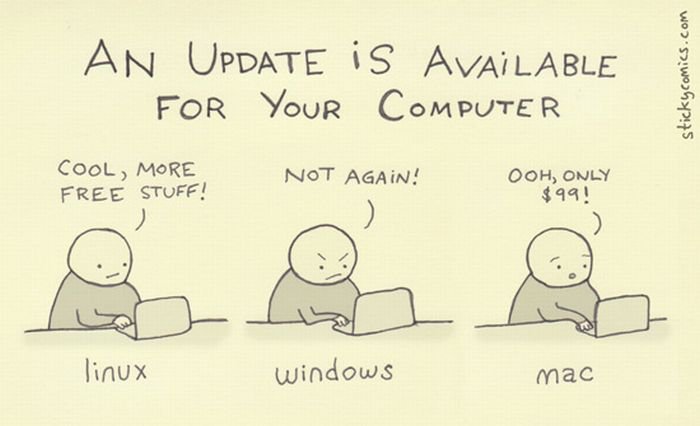For those who don’t remember the original of this was an ancient meme:

Edit:
Just how old this meme is: OSX 10.9 mavericks was the first free mac update, it was released in 2013. The meme should be created before that. Iirc Windows 7 was the first win with forced and annoying updates, it was released in 2009. So this meme should be from that era, 11-15 years old.
Edit2:
I found the original post, my calculations were correct, this is from 2011: https://www.stickycomics.com/computer-update/
I use linux and I’m in the Not Again boat. Seems like everytime I update, something goes wrong
Use debian oldstable, usually 1-2 security updates each months, nothing else. If you need a newer app, install it as flatpak, they can’t bork your system.
Stable is already ancient enough, but willingly running oldstable? I hope you’ve got a shovel ready
what are you using?
Arch. Just updated a few days ago, got some java conflict stuff. Jdm jre or some kind of error. Had to read what people online did to fix that.
Edit: lmao why am I being downvoted?
You’re probably being downvoted because you say “Not Again” to updates while using a rolling release distro. Like ordering a daily newspaper, then getting annoyed at getting a new issue every day.
Just because I use rolling doesn’t mean I am mandated to update every minute of my life. There are times when I’m genuinely excited for an update like for example when KDE does something new. Pretty much everything else is just little tweaks and bug fixes that will most likely result in me reading docs and figuring out what went wrong.
Sure, but the common consensus seems to be that you shouldn’t be annoyed at the constant updates when that’s an explicit feature of that system. Maybe that’s just a misreading, but I assume the expected reaction would be “Not now” rather than “Not again”.
(I’m not taking a position, as I’ve never worked with a rolling distro and can’t really comment on either stance, just trying to navigate the confusion here)
My reaction is more of “not now”. Not again might happen when something breaks. So every update is a little gamble for me.
You’re not mandated to update often but its encouraged.
It can be a lot easier, for example, to fix one small break three times than it is to fix 3 breaks at one time.
Well yeah, rolling release distros inherently require more fixing because you get all of the software as it is patched with far less testing for conflicts. If you want something you have to fix less get a stable release
Which is kinda why I like waiting a little but that doesn’t really matter because it’s always rolling. Guess I’m just delaying having to fix my system. So I update whenever I’m not busy with my life.
Yeah, I’m just saying with Arch the tweaking is a feature, not a bug. You can get the same UI with something far more plug and play using something like Debian Stable or even Mint if you like Cinnamon. I’m an openSUSE stan myself but thats just because I like to experiment, break things, and then roll my system back.
Lol switch from arch if you like waiting a little
Nah it’s fine. I like to get the latest kde updates.
Maybe because the jre thing was an update that required manual intervention, there was an Arch news item about it. You’re expected to read the Arch news before an update when you’re running Arch. This can be automated with
alias update='yay -Pw && pacman -syu'If that’s too much for you, use a different distro.To make it even more convenient, register to their mailing list and you get a heads up.
My ADHD and 1297 unread emails make that a bad idea.
With the alias, the news pop up in front of me right when they’re relevant.Those are rookie numbers son, you gotta get on that.

Why can’t it print into as part of the update? Why is it a separate command?
It’s the KISS philosophy. The package manager is for managing packages, not for reading mail
I’ve seen this a few times with various distributions. People always say stuff about checking news files or whatever their distros call them. I have no idea what those are or where to find them. It would seem extremely prudent for the update tool to print relevant information.
Brew does this. (I am not using Brew as an example of a perfect package management tool.) It also has “caveats” that get printed for some packages. It seems much more useful this way.
Printing the entire change log is overkill, but at least breaking changes and such would be extremely useful.
I just went “Shiit! Am I sitting on potential system breakage?” (because I don’t remember doing any such intervention)
But turns out it was just a conflicts with change.From what I know,
pacmanstraight-up asks you what you want, in these cases. Sure, it’s technically manual intervention, but for me, who scans over updated packages every-time, this is considered standard procedure.Manual intervention is when GRUB doesn’t install properly using the suggested command and you have to learn where your distro places the boot image and configure stuff accordingly.
Also, I don’t have JDK so…
Arch is great when you’re somewhat experienced with Linux. Otherwise I recommend an Arch + QoL distro like EndeavourOS.
I’m a developer using Linux for well over a decade and a half and I use EndeavourOS because it just adds a level of ease.
It’s fine though, I know what I signed up for. I used Ubuntu for a year before moving over to Arch and and I quite like it. Everytime I decide to update though, I try to do so when I am not busy during school, and prepare for the worse when I do plan to update.
If you want rolling release, but still a stable distro, just go with OpenSUSE Tumbleweed, it’s a rolling release with snapshots that you can go back to if something breaks. IIRC they also have a special app verification thingy that’s supposed to be more stable than Arch’s.
Are you talking about the major java/jre repackaging issue, that was announced (proposed update procedure included) on the archlinux news-page, that you are supposed to check before an update?
If so, then you can’t really blame the distro, if you don’t follow basic best practice guidelines.
And then you’d also be pretty late to that update and should run updates more frequently. Once a week to at least once a month is a good idea. That’s the idea of a kinda bleeding edge, rolling release distro.If you want reliable updates Arch isn’t the best fit IMO.
It can be perfectly reliable for sure, but it’s permitted not to be.
If you really want to update and not worry about it, I would consider Fedora, they test updates and upgrades while also being very close to bleeding edge.
I was totally in the same boat just a decade ago.
The comments on the original post are… interesting…
DISREGARD THAT, I SUCK COCKS
Just kidding. I suck cocks too! :D
You’re right, I suck cock and I love it. I have never felt so understood until now. Disregard my prior comments. Go
Windows!
How I miss bash.org
i’m surprised there’s not a single slur in there
Wow a real life ROFLCOPTER…
Oh yep, and someone calling them a loser for saying it. Classic.
Well, now they just make you throw out the old Mac hardware and buy new for $1299 (8gb RAM lol) because it’s now out of support for the latest MacOS and the newest versions of Adobe Suite/MS Office/insert productivity work related proprietary software suite here is on board with Apple’s bullshit and won’t run on older MacOS versions.
The more things change, the more they stay the same.
I tried to install Win 10 in a VM recently and it spend hours updating after installing from the ISO. Also you have to turn off the internet to not create a Microsoft account? What a pain it is now.
You need to update your ISO.
There are newer releases, obviously if you download an older build of windows, you have to download and install each updates manually. It’s not a win only thing, it’s the same with every os, e.g. download Ubuntu 16.10, it will take a while to upgrade to the current version. Windows 10 was released in 2015, I don’t know which release you downloaded.
About the account, the answer is OOBE\BYPASSNRO
I thought I had a virus when I got a pop-up about Ubuntu pro. I thought all linux was free and there’s no way I’d be getting ass for features I don’t have
no way I’d be getting ass for features I don’t have
Not with that attitude
Ubuntu pro is completely free for non-commercial users tho
Dude, you chose the wrong way.
What are the distros that would align with these categories?
Cool, more free stuff:
Not again!
Ooh, only Ubuntu pro:
- Ubuntu
1st: Fedora
2nd: ArchDebian would be: “nothing changed!” (with a sad or happy guy depending on use case)
With Debian it’s more like “cool, everything still works as expected.”
Source: I don’t use Arch btw.
Your arch system would probably have updates unless you just updated within the last few minutes. Being suprised seems a bit unnecessary.
I sometimes update out of habit almost immediately after I updated. That’s always a little disappointing.
And then you actually have a new update available… Happens to me to often
deleted by creator
Oh god, me too. It’s a Pavlovian response!
Finally, a use for the
* * * * * *cron expression!
If you’re on Arch, then you want those tasty hourly updates om nom nom
source: I use Arch btw
All I wanna do is sudo pacman -Syu
paru -Syu, you don’t want to forget your AUR packages, right?You can do the same with just
paru. No flags necessary.Or save yourself a character and just
yayHeathen, using any software not written in rust is sacrilege
I’ll even add some characters and use pikaur
I like to be a bit more explicit than necessary.
Explicit is better than implicit.
Unless you’re trying to get a movie or game to get a teen-friendly rating, in which case you might not want to make the sex scenes quite as explicit.
I have seen horrors beyond comprehension because i tried updating aur packages
Well, it’s easy enough if you only use precompiled packages. Beyond that you should probably have a better understanding of what you are doing.
Oh no i know what im doing. I just had dependency hell way to often with aur packages so i just dont update them anymore unless i need to do so
Not being able to Syu every 5 minutes and only being able to update once a day was the biggest challenge when I changed to NixOS
I don’t think the first two are distro specific, more a question of mindset. Unless there are distros that force update your system like some other OSs, which could cause the second picture to happen more often.
On fedora atomic all updates are automatic. I don’t even see that they happen. They just happen in the background. I love it.
Neat! I was just thinking, if it starts updating the kernel as you turn it off, you’d have to wait a minute for it to finish. M$ style. Has that never happened?
No. That’s not how it works. It installs a new image alongside the current one and once you boot again it simply boots into the new image. Never ever wait for an update again.
Oh right, atomic distros work differently, didn’t think about that! That is convenient!
Very convenient because if something happens where the update breaks something, you can just boot the previous image.
Does it give you a choice at startup, similar to the Grub menu, or do you have to do something to bring the option up?
How are you getting it to do that? Fedora wants to reboot every day for me, even for the simplest update.
Fedora atomic, e.g. silverblue, not traditional fedora. It still wants to reboot after each update but I don’t see it and when I reboot, it boots into the update.
If Fedora plays nice this time around, I’m seriously considering Kinninte and Atomic Budgie for 41. (But Fedora always ends badly for me)
They’re also very stable do to the image-based VCS.
The first could be any decent distro like Debian, Fedora, Mint.
The second would probably be rolling release because of the amount of packages lmao.
I was thinking that the user intentionally chose their distro, because of the Ubuntu character.
Cool, more free stuff
Arch, you want more free stuff faster
Not again!
Debian, you want to set and forget, so any updates that do come up are still a nuisance
- Arch
- Arch
- Ubuntu Pro
sudo pacman -SyuCool, more free stuff! Fresh as a morning breeze.Running rm -rf / afterwards because of minimalism
deleted by creator
Tee hee
When will AI pick this up as advice?
Make all the mistakes you want to. There’s a lesson under every leaf in this world.

(probably the most downvoted post i’ve made yet on lemmy 😂)
Ubuntu pro is free to enable btw
unless you’re using ub server for commercial purposes, then you’re breaking the agreementWhat? How?
You mean a free Ubuntu pro account for personal use?
b-but that requires signing up. too much effort 😅
I think it looks like Microsoft is requesting a ms account to use/install Windows, I think it’s weird to request registration for non-commercial users
deleted by creator
happy cake day
ty
If you’re not paying for the product, then you’re the product.
(I don’t believe the above quote to be absolutely true, but I’m not sure what motivation Canonical could have to lock some features of the OS behind a free account except $$$.)
If you’re not paying for the support, then you are the support.
No, random Internet forum users and whoever is lurking in IRC/Matrix are the support. Kind of like that 2 by 4 in my basement is supporting the entirety of my house’s main beam.
Yeah, but Canonical locks security patches behind payment or signup, not just support.
you are the security patch.
sudo apt uninstall
Canonical already maintains security patches for paying customers so they aren’t actually doing any extra work, but putting it behind a subscription gives them an option to start charging more for desktops, gives clear cost for server use, and maybe is marketing for “look at the premium work we do”.
Seems really dodgy to me making your business model holding security features hostage for either money or sign-ups, honestly.
Kindof like charging people for vaccines against deadly diseases or something.
But then again, my craw may be extra susceptible to sticking when it comes to such things.
How do you think research for vaccines is funded? Someone pays for vaccines for deadly diseases eventually
Preferably taxpayers. Not that that part of the analogy relates to Ubuntu.
In any case, the company who makes the vaccines doesn’t pay it. Ubuntu could make the argument you get the security upgrades if the government wants to pay for them
From my look at it, Ubuntu is making it clear that they guarantee support for 10 years, rather than just the standard 4 of LTS releases. And they are also guaranteeing compliance for enterprise uses, saving the paperwork load and time. This could make Ubuntu Pro attractive for enterprises and the IT department. Everyone wants to limit the paperwork checks. Us plebes, can make do with the free standard 4 years of LTS support if that’s what you want.
I’m quite sure that any distro that offers enterprise solutions is doing similar things just for the money. RedHat does it for sure. But us plebes don’t ever see it because we use Fedora instead.
Also making people familiar with your system makes it more likely that they’ll want to use it at work, too
It you are a business then you pay for the product.
I’m not paying for Lemmy.
$ nixos-rebuild switch --use-remote-sudo --flake ~/dotfiles#desktop
😎😎😎

Hm, I want to pull the trigger on nixos
If you’re not using a standard DE (Gnome, KDE,…) but rather something like i3, Hyprland,… then I highly recommend starting with home-manager on whatever distro you’re currently on. Once you’re happy with that setup, it’s really easy to add the “rest of the system” without risking a giant headache because your desktop still needs to be configured
I’d be willing to help you get started.
Isn’t the --remote-host missing here? (Since you’re using --remote-sudo?)
What does Ubuntu Pro get you besides extended support after the normal OS EOL?
Access to “real time” kernel which is useful for drones etc.
Extended compliance support. Enterprise level needs require a lot of paperwork just to make sure you are in legal compliance with all rules and regulations. The paperwork alone can be a very heavy costly burden on the IT department.
Any distro wanting to be serious in the enterprise space needs to offer support for that. And businesses will pay for it because it’s cheaper than having a large staff only dedicated to it. It’s part of how Ubuntu can offer you the free stuff and remain a top used distro for the masses. RedHat does the same. RedHat just rebrands the free stuff as Fedora. At least Ubuntu doesn’t hide behind a different brand name when offering sercives they charge for.
…Debian. The free stuff is called Debian.
It’s also called ‘the old free stuff’. If free matters that much, you could run Slack or better yet LFS.
Ubuntu is literally Debian with an upstream Kernel. Ubuntu is charging for Debian’s labor.
Only if you want enterprise solutions. RedHat does the same. So does Suse. A business should pay for enterprise level supports and solutions don’t you think?
Kernel live patch, security updates for packages that canonical doesn’t own/maintain, and access to certain configurations/options like fips
I’m an annoyed fedora user and it seems every day there’s an update that requires reboot to install. I want the latest patches to keep the system secure, but this is annoying, and I use 2 laptops.
sudo dnf up
Works for me.
Sorry, that will forever be Did Not Finish for me. 😣
Speedcubing or racing games? That’s where I know that term from
While that works, it sometimes might break things: https://fedoramagazine.org/offline-updates-and-fedora-35/
Crashes are just the system telling me to restart. As god intended.
Except if you ran the update from within a graphical session and your session crashed, as this will kill DNF, making the update incomplete and potentially corrupting files. I recommend you either:
- use the graphical updaters
- run dnf from a TTY
- or use some of the atomic spins, having atomic updates on btrfs subvolumes
Switched to nix in the meantime.
Thanks, i might start using that so i can continue work while it’s installing. Even if I’m going to reboot later, i won’t have to wait for it to install before using the system.
You need to “sudo dnf clean all” first to make sure you get the freshest index!
You can do that, but it is not necessary.
It’s not necessary but you’ll get updates quicker. And I’m a chronic updater, even pick and choose stuff from updates-testing.
I recommend “dnf automatic” to fetch the latest package index in background
You can change that in system settings on KDE
System settings -> Software Update -> Apply system updates immediately
Not sure if it’s the same on GNOME
No, there is not. Updating through terminal still bypasses it and I don’t mind so much seeing how my mother might accidentally power it off in the middle an important update otherwise. Most people know not to hit the power button when the scary load bar pops up with a message saying please do not power off system.
Yeah, I’m using Fedora KDE and Budgie on a laptop and mini-desktop. There were a boatload of updates over the weekend. I understand the safety of doing a reboot to be up to date, but it does give me flashbacks to Wondows.
But, you can use sudo dnf upgrade and only need to reboot when you want to. Updating through Discover tends to make you reboot a lot.
I disabled it on day 2 in fedora KDE spin
Fedora/Arch/Ubuntu
Obviously you’ve never used Arch btw. We live for the
sudo pacman -Syu.there is something very satisfying about running pacman -Syu at the end of the day and watching it update the repos, give you a neat list of packages to be upgraded, then see them downloading over all your threads with that little chomp chomp pacman animation, disappearing one by one, or a bunch at once, and then at the end it runs the hooks and you see that [1/23] fill up all the way to [23/23] in the span of a minute…
It’s like popping bubble wrap, but you have 8 hands and 8 bubble sheets and never try to pop the tame bubble twice
You could also live for
yay -SyuOr just
yay
I’ll sometimes even run pacman -Syu right after updating. It works surprisingly often.
yay! :)
I’ve started to become 2) for some stupid reason.
I use btrfs snapshots to backup my system, and it has the side cost of needing a bit extra space. This is absolutely fine.
What is not fine however is free desktop/Nvidia flatpaks update. I get 10gb every week, and it keeps filling my disk with this stupid crap.
Not only that I am both a rust programmer and blender artist, and it’s the trinity of non deduped disk space filler
Maybe it is a Nvidia thing
Im in the middle, 4 times a day 😂 what distro?
Btw
Ohh 🤣 yea, i meant the one on the left bot middle 🙈
Updating my Linux is my main task on my Linux 😜 guess I have to look into kernel development





















